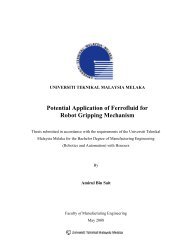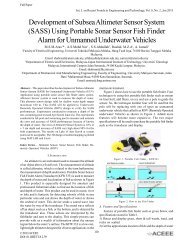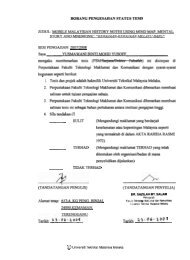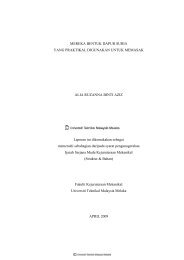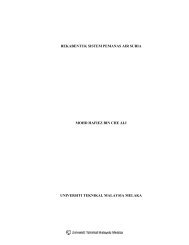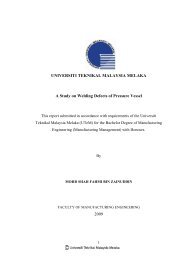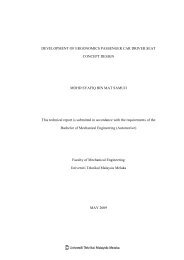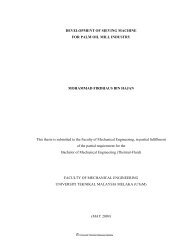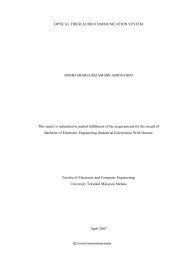Brand, Identity and Reputation: Exploring, Creating New Realities ...
Brand, Identity and Reputation: Exploring, Creating New Realities ...
Brand, Identity and Reputation: Exploring, Creating New Realities ...
Create successful ePaper yourself
Turn your PDF publications into a flip-book with our unique Google optimized e-Paper software.
The Formation of <strong>Reputation</strong>s in Business Markets<br />
Chunyan Xie, Stord/Haugesund University College, Norway<br />
Sven Haugl<strong>and</strong>, Norwegian School of Ecnomics <strong>and</strong> Business Administration, Norway<br />
Introduction<br />
Corporate reputation is usually studied from a communication perspective. A firm‘s reputation as it is judged by external<br />
stakeholders is assumed to be formed on the basis of direct <strong>and</strong> indirect experiences <strong>and</strong> the information received (e.g., Fombrun &<br />
Shanly, 1990; Yoon, Guffey, & Kijewski, 1993). The focus in this perspective is on the information signals that a company sends to<br />
actors in the environment, <strong>and</strong> how this information is perceived <strong>and</strong> interpreted by external stakeholders. A limitation is that it does<br />
not take into account how a company organizes <strong>and</strong> manages its continuous interactions with core stakeholders such as suppliers <strong>and</strong><br />
customers, <strong>and</strong> how such interactions impact reputation. We argue that in business-to-business contexts, a customer‘s judgment of a<br />
supplier‘s reputation cannot be properly explained from an information perspective, but rather we need to take into account certain<br />
characteristics of the relationship between the actors.<br />
This study therefore addresses reputation from a relationship perspective by arguing that how a company (e.g., customer) evaluates<br />
the reputation of another company (e.g., supplier) is influenced by the continuous interaction between the two companies. While<br />
reputation has been widely studied in consumer markets, this construct has received less attention in business markets. One reason<br />
may be that trustworthiness serves some of the same purposes in business-to-business relationships as reputation in business-toconsumer<br />
relationships. However, reputation <strong>and</strong> trustworthiness are different constructs, <strong>and</strong> the fact that we have limited<br />
knowledge about the formation of reputation in business markets underlines the importance of studying reputation in B2B contexts,<br />
<strong>and</strong> how reputation <strong>and</strong> trustworthiness are linked to each other.<br />
The purpose of this study is first to analyze how customers evaluate supplier reputations based on what kind of relationships they<br />
have with their suppliers. We test the impact of specific relationship characteristics on reputation. Second, we analyze how the same<br />
characteristics are related to trustworthiness to get a better underst<strong>and</strong>ing of the differences <strong>and</strong> similarities between reputation <strong>and</strong><br />
trustworthiness, <strong>and</strong> third, we study how reputation <strong>and</strong> trustworthiness are related to each other.<br />
Theoretical Background <strong>and</strong> Hypotheses<br />
Concepts like identity, image <strong>and</strong> reputation are commonly used to describe what individuals or other actors know or believe about<br />
an organization. Fombrun, Gardberg, <strong>and</strong> Sever (2000, p. 243) defined corporate reputation as ―a collective representation of a<br />
firm‘s past behaviour <strong>and</strong> outcomes that depicts the firm‘s ability to render valued results to multiple stakeholders‖. We are in this<br />
study especially concerned about the formation of such collective representations by studying how customers evaluate the reputation<br />
of key suppliers.<br />
We take the view that reputations are formed not only on the basis of communication <strong>and</strong> information, but also on the basis of direct<br />
interactions between companies. In order to unpack possible relationship characteristics that may have an impact on reputation, we<br />
take a broad perspective <strong>and</strong> include dimensions both at the inter-firm level <strong>and</strong> at the inter-personal level. Particularly, we examine<br />
two firm-level dimensions; (1) dependence between the actors <strong>and</strong> (2) reliance on relational norms, <strong>and</strong> two inter-personal<br />
dimensions; (1) common knowledge <strong>and</strong> (2) inter-personal trust, <strong>and</strong> we study the impact of these dimensions on reputation.<br />
Furthermore, these dimensions will also be linked to trustworthiness to explore if the same or different factors impact reputation <strong>and</strong><br />
trustworthiness.<br />
Inter-firm characteristics are related to the overall structuring <strong>and</strong> management of the relationship. Dependence between customer<br />
<strong>and</strong> supplier indicates how important the actors are for each other in terms of performing their operations. We include both<br />
customer‘s dependence on supplier <strong>and</strong> supplier‘s dependence on customer. Dependence causes the actors to be attached to each<br />
other, <strong>and</strong> it is reasonable to believe that the actors will develop positive evaluations of each other because of such attachments. Thus,<br />
we propose:<br />
H1a. Customer dependence on supplier will be positively related to reputation <strong>and</strong> trustworthiness.<br />
H1b. Supplier dependence on customer will be positively related to reputation <strong>and</strong> trustworthiness.<br />
Relational norms imply that the actors are expected to follow certain patterns of behaviour (Rousseau, 1995) developed in the<br />
relationship on the basis of shared norms <strong>and</strong> values (Dwyer, Schurr, & Oh, 1987). Relational norms represent an informal, selfenforcing<br />
way of governing inter-firm interactions. Relying on relational norms as a governance mechanism requires that the actors<br />
are able to develop well-functioning working relations for h<strong>and</strong>ling the day-to-day interaction between the actors, <strong>and</strong> we argue that<br />
relational norms will result in a favourable judgment of the partner‘s reputation <strong>and</strong> lead to a trust-based relationship.<br />
H2. Relational norms will be positively related to reputation <strong>and</strong> trustworthiness.<br />
With inter-personal characteristics we refer to the relationship between the contact persons in the customer <strong>and</strong> the supplier firm. In<br />
this study, we focus on common knowledge about mental models (S<strong>and</strong>e, 2007), which refers to the contact persons‘ knowledge<br />
about each other in relation to how they judge market conditions <strong>and</strong> company opportunities, perform internal coordination <strong>and</strong> make<br />
decisions in relation to their respective companies. If the customer contact person has good knowledge about the working conditions<br />
of the supplier contact person, <strong>and</strong> vice versa, this common knowledge is likely to result in favourable evaluations of reputation <strong>and</strong><br />
trustworthiness.<br />
H3. Common knowledge will be positively related to reputation <strong>and</strong> trustworthiness.<br />
Inter-personal trust captures the customer representative‘s level of trust to the contact person in the supplier firm. Developing high<br />
levels of trust between the company representatives is usually considered to be important for developing well-functioning inter-firm<br />
276



